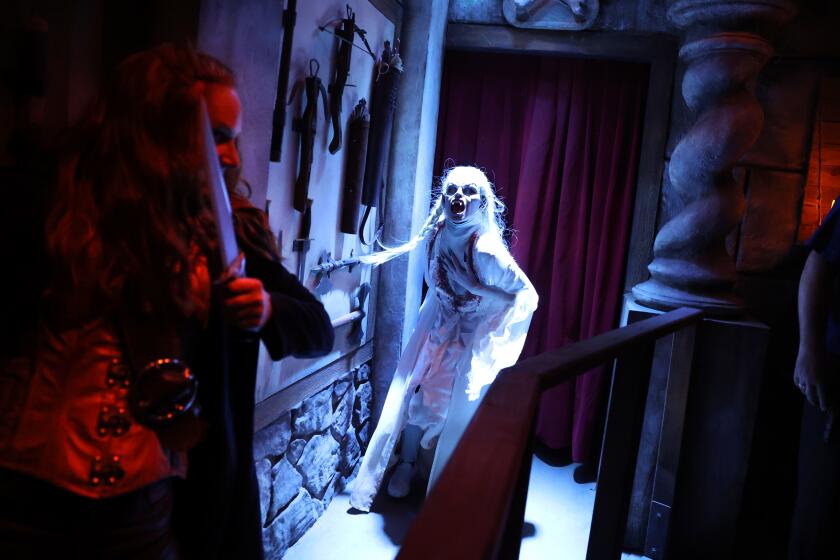Events Span Coasts, Continents, Cultures
First goldfish and then a golden spike will be featured in events at the Autry Museum of Western Heritage. This weekend marks the annual Japanese-American celebration of children, which has the koi as its symbol, and May 10 is the anniversary of the pounding in of the golden spike, signaling the completion of America’s first transcontinental railroad.
At the first event, Donna Dickerson, an education specialist at the museum, will conduct an afternoon crafts workshop for kids ages 2 to 12, devoted to the traditional Japanese practice of making koi nobori banners, which look like a cross between a big, stylized carp and an airport windsock. Materials will be provided to all participants.
Many Japanese and Japanese Americans traditionally display koi nobori banners around their homes in early May in celebration of Kodomo-no-hi, or Children’s Day.
“It was traditionally called Boys Day,” Dickerson said, “because the display involved one symbolic carp for each boy--in hopes he would develop the admirable carp trait of swimming upstream against the current.”
The museum’s observance of this holiday will extend beyond its Griffith Park location. The Autry will have a booth in this weekend’s Little Tokyo celebration of Children’s Day. (For information on this downtown event, call the Japanese American Cultural & Community Center at 213-628-2725).
Meanwhile, back at the ranch, the Autry Museum on Saturday will also be celebrating another symbol--the golden spike that joined the American coasts, east and west, on May 10, 1869. It was on that day that the Union Pacific Railroad met up with the Central Pacific in the Utah desert.
This event was reenacted by legendary movie director Cecil B. DeMille and a cast of thousands as the climax of his classic western “Union Pacific.” The Autry will present a special screening of this movie at 2 p.m. Saturday--including a presentation on DeMille’s career by film historian Bob Birchard of La Crescenta.
So while children younger than 12 are making banners at the museum, older ones might be interested in watching a rootin’-tootin’ western extravaganza made by the man who, Birchard says, “invented Hollywood.”
Many experts agree, citing DeMille’s earlier western “The Squaw Man” as the first feature film to be shot in Hollywood. On Saturday, Birchard plans to show his audience that much of the 1913 silent movie was made in North Hollywood, and he has slide illustrations to prove it.
He will also explain that the barn where DeMille had his studio headquarters was originally in Hollywood near Sunset and Vine, although it now sits in the Cahuenga Pass by the Hollywood Bowl. Birchard is a former president of Hollywood Heritage Inc., a group of film historians headquartered in that restored historic building.
“Movies are like a time machine that allow you to travel back in time on many levels. You can see the Valley around Chandler Boulevard in 1913 and Agoura in 1939,” said Birchard, referring to “Squaw Man” and “Union Pacific” background shots. The events DeMille dramatized are from yet another era--the previous century’s settlement of the American West.
“Kids will learn a lot from watching old films,” he said, “Watching [‘Union Pacific’], a historically accurate re-creation of events with an entertaining story, is a painless way to learn history.”
DETAILS
* WHAT: Celebrations marking Children’s Day and anniversary of the driving of the golden spike.
* WHERE: Autry Museum of Western Heritage, 4700 Western Heritage Way, Griffith Park.
* EVENTS: Saturday: 1:30-3:30 p.m., traditional Japanese crafts workshop, with materials provided; 2 p.m., program on Cecil B. DeMille and screening of “Union Pacific.” Sunday: 2 p.m., “Union Pacific” screening.
* HOW MUCH: General admission to the museum is $7.50 adults, $5 students and seniors, $3 kids 2-12. Saturday lecture on DeMille, including “Union Pacific” screening, is an additional $5. The Sunday screening is $3.
* CALL: (213) 667-2000, Ext. 340.
Sign up for The Wild
We’ll help you find the best places to hike, bike and run, as well as the perfect silent spots for meditation and yoga.
You may occasionally receive promotional content from the Los Angeles Times.



